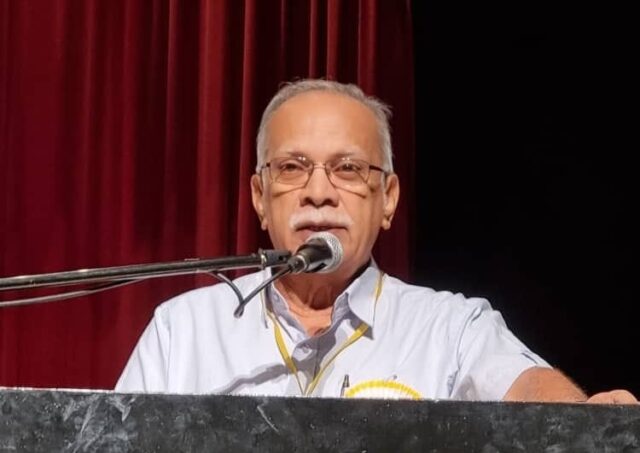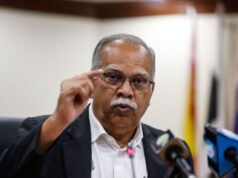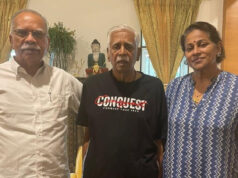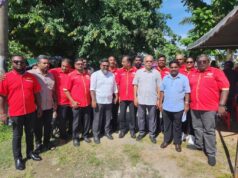A recent attempt in Klang calling for meeting to form a Indian party hits the news.
Apparently, Prime Minister Anwar Ibrahim who supposedly gave his blessing for this attempt, has since distanced himself from formation of the new party.
In fact, number of Indian political parties were formed in the past, many of them exists in terms of their registration, but hardly effective.
Many of their leaders simply wanted to use the existence of their parties to obtain chance to contest the elections.
The questions are: do Indians in Malaysia need new race-based political parties?
Rather than race-based political parties, Indians should have faith in the politics of multi-racialism.
Whether Indians need more race based political parties or not, they cannot be denied the right to association whether in the form of political parties or civil society organisations.
The right or freedom of association is a fundamental right of Indians or any ethnic segments in Malaysia.
The right to association is a fundamental constitutional right of Indians even if there are plethora of Indian political parties. Forming political parties is one thing, but succeeding in getting the support of the community is another.
In fact, nearly almost all Indian political parties in the past have failed to effectively and honestly champion the sad and tragic plight of the Indian community.
Just as Indians have the freedom to form political parties they at the same time have the right to fail and fold up their political organisations.
Nobody can deny the right to Indians to form political parties and fail. History has shown us there a greater likelihood for parties to fail rather than succeed.
However, despite the hindsight, Indians will not cease in their attempts to form political parties to take up the noble cause of their community, come what may.
The attempts to form Indian parties is not the cause but the effect of the larger problem of the fundamental neglect of the Indian community by the government.
Critics rather than belittling the attempts to form Indian political parties, they should find out why Indians have been discriminated and neglected in the country.
In other words, attempts in forming new political parties is not the cause but effect of Indian discrimination and neglect by the majoritarian government.
The cart should not be placed before the horse. It is said that Indian political parties might not succeed because Indians are heterogeneous, numerically small in population and limited electorate strength.
If 85 percent of Indians are Tamils, how can the community be termed as heterogeneous?
If 85 percent of Indians are Hindus, how can be classified as religiously heterogeneous?
I hope that these critics are not saying that Indians are also divided by caste and other sub-communal ties.
How come when the Hindraf movement peaked in 2007 with the support of the vast majority of Indians, heterogeneity was never invoked.
How come when plantation labour was mobilised by the left-wing forces in the immediate aftermath of World War II, heterogeneity was never invoked?
It is further argued that Indians given their numerical weakness should focus on strengthening the forces of multi-racialism in political parties such as the DAP and PKR, both in PH.
There is nothing wrong with the concept of multi-racialism, but the multi-racialism in the PH leaves much to be desired for. In the name of multi-racialism important issues of the community have been side-stepped.
Indians have been lulled into thinking that multi-racialism is the way to go about, but in actual fact multi-racialism has sunk the legitimate demand of Indians.
Theoretically speaking, multi-racialism in PH seems to subdued and subordinated to the majoritarian politics. How can Indians articulate their specific demands if multi-racialism meaning don’t spook the Malays is used to drown their legitimate identity questions.
Even serious minded Marxist theoreticians are first to admit that recognition of identity (nationality) questions are essential to the progress of socialism.
If the left considers the salience of identity questions, I don’t understand why liberal thinkers are not willing to concede importance to identity questions.
If multi-racialism fails to accommodate the interests of the Indians, then what are Indians supposed to do—wait for the day when true multi-racialism returns to the country?
The failure of earlier established political parties should not be used as gauge to belittle new Indian political formations. Critics can say what they like, but forming new political parties must be seen as the right of Indians in seeking association for the betterment of Indians.
Just as Indians have the constitutional right of association, they too must accept the likelihood of failure. Unless and until the community, the members of the working class, are organised on the basis of common vision, failure will always loom on the horizon.
Forming political parties is an easy task, however, to get the solid backing of the community is a more formidable task. To say that Indians don’t need new political parties because they are numerically small, heterogenous and others are reasons that seek to belittle the community that has contributed much to the nation.
History has proven beyond reasonable doubt that Indians under the right political circumstances can be mobilised under the right leadership to articulate to seek qualitative improvements to their lives.
Those who are saying that Indians don’t need race-based political parties are basically lending credence to the hollow multi-racialism in PH.











